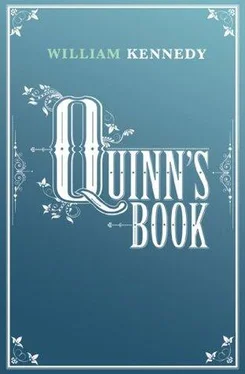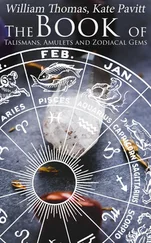“We meet again,” Joseph said, coming over to me. “I have something for you,” and he handed me a letter, the first article of mail I had received in my fifteen years of life. “It came from Rochester,” he said. “I mentioned to a traveling actor your interest in La Última, and when he met her he spoke of you.”
I took the letter in hand and at the sight of the handwriting the life within me gathered great potency. I knew the letter was from Maud, for in my possession since before she left were four words she had written on a piece of stationery in a near-perfect hand: “The sadness of bumblebees”—this meaning I knew not what. When I saw her throw it away, I salvaged and kept it.
“I’m very grateful to you,” I said.
“We must keep track of our friends,” Joseph said.
He spoke of my rescue of Dirck, said he adjudged me a hero and was proud to know me. He carried on in that vein, asking me questions as Dirck thrust more messages into my fist (“Ask her age. . where she lives. . what her religion. . her favorite flower. .”), and so, with my head full of questions and my hand full of scraps of paper, I had to relegate Maud’s communiqué to my trouser pocket.
“What a grand house this is,” said Joseph Moran. “I would like to live in it one day.”
“Yes,” I said, feeling possessive, “I live in it now.”
Dorf set his tambourinist and banjoist to playing and followed their medley with an introduction of Heidi Grahn singing an air from The Marriage of Figaro that Jenny Lind had often sung, and in truth I know not how the Swedish Nightingale could have sung it more melodiously. Dirck’s pencil fell silent at last, he in rapture at the sound of the young woman’s voice, and I, at last, was able to open Maud’s letter and read her salutation, “Dearest Daniel,” at which my heart began a percussive thumping. My eye followed down the page, running ahead of itself too quickly to allow me to make sense of anything. But then I read these words: “am awaiting the fulfillment of your promise to steal me,” and I could read no further, so rich was my excitement. Then the ecstasy was violated by a loud knocking that intruded as well on Heidi’s melody.
We turned to the foyer to see Capricorn admitting, to my great surprise, a most serious-visaged Emmett Daugherty, and with him a weeping girl of perhaps eight years, a boy somewhat younger than myself who was tilting his head back and blotting his nose with a filthy and bloody rag, and a woman, the children’s mother, in a state as wretched as womanhood can inhabit. The music trailed off as we stared at these representatives of a gravely negative unknown.
Emmett led the woman and children to a sofa in the foyer, then asked to speak with Lyman, who heard Emmett’s request and rose from his seat in the music room. I followed but kept my distance, seeing Matty run to the kitchen and return with a wet towel to clean the boy’s bloody face, take the old rag from him, and lay him full-length on a bench with his head back.
“It’s a tragic thing,” Emmett said. “Alfie Palmer, one of the moulders let go in the layoff, he did this to them.”
“Why do you bring them here?” Lyman asked.
“It’s a foundry matter, Lyman,” said Emmett. “And it’s your foundry.”
“Does Harris know about this?” Lyman asked, Harris being the Yankee engineer who ran the foundry in Lyman’s absence.
“I’ve no use for that man, Lyman. It’s his layoffs began this trouble. Your good self is what’s needed. None other. Alfie was always a hard-luck man, and with the layoff he had no doctor money when his son got sick, and he could only watch the boy die. It maddened him, as it would any man, and he took to the drink, though I don’t know where he got money for that. And there’s been fights — dozens — between the new hired men and the old let go, and Alfie in more than his share of those. But he went beyond a punch-up tonight. He followed Toddy Ryan home when Toddy left the foundry, giving him heat, don’t you know. But Toddy’s only the half-pint, with no health to him at all, and he knew if he fought Alfie he’d be killed sure as sure is, and so he ran to his shack and barred the door, but Alfie broke it in and split Toddy’s skull with an ax handle. Then he went after young Joey here, and it looks like he broke the lad’s nose. Toddy’s wife throws the boilin’ tea in Alfie’s face, gets the children out, and brings them to the foundry to find me. But her Toddy’s dead on the floor and there’s no peace for it now, Lyman, no peace. Alfie’s on the run and the men are in camps, the old and the new. They’ll fight in bunches, and they’re forming already. There’ll be blood in the streets by morning.”
Emmett, his craggy face overgrown with two days’ stubble of beard, was a scolding presence. He was foreman at Lyman’s North End foundry, and had risen in eleven years, despite his lung ailment, from apprentice to moulder to chief grievance spokesman, a voice of righteous reason from below. His rise in status began when he hired on as coachman for Lyman on an expedition to buy land in the Adirondack region for a new railroad line. Animosity toward the venture was strong, the natives convinced the railroad would before long destroy their pristine world (and so it would), and the animus peaked when half a dozen mountain men set upon Lyman and his lawyer with plans to tar and feather both.
While Lyman contemplated probable death by absurdity, Emmett garroted one of the attackers and bargained the man’s breath for the two captives, an act of bravery that ensured not only his own security ever after through Lyman’s gratitude, but also the education of any Daugherty heir not yet born, or even conceived, on this night of tribulation in the foyer of Hillegond’s mansion.
Maud, I speak to you now of the Irish, knowing you are in my pocket, to tell you of the Ryans and their misery and how it distracts me, for it is part of me: Joey Ryan — with broken nose, dead father, sickly mother — is surely myself in another guise, just as Molly Ryan, that tiny waif, could be you. They are the famine Irish, Maud, and they are villains in this city. It wasn’t this way for the Irish when I was little, but now they are viewed not only as carriers of the cholera plague but as a plague themselves, such is their number: several thousand setting up life here in only a few years, living in hovels, in shanties, ten families to a small house, some unable to speak anything but the Irish tongue, their wretchedness so fierce and relentless that not only does the city shun them but the constabulary and the posses meet them at the docks and on the turnpikes to herd them together in encampments on the city’s great western plain. Keep them moving is the edict of the city’s leaders, and with obscene pleasure the Albany wharf rats and river scum (some Irish among these, preying on their own) carry out this edict by stoning the canalboats that try to unload newcomers here. It is no wonder the greenhorns grow feral in response, finding in this new land a hatred as great as that which drove them out of Ireland, that suppurating, dying sow of a nation.
Looking at the Ryans one could believe them carriers of any perniciousness: defeated, low in spirit, clad in rags, their skin flaked, pale, and dirty, their hair matted, their eyes raw with the disease of all victims. Who would invite their like? Who would give them bread or bed? None in this city today, and yet not quite none, for Hillegond is doing for them what she did for us: telling Capricorn to find them street and bed clothes; telling Matty to cook for, cleanse, and accept them on their night of trouble here in this haven for ravaged souls.
People are breaking into groups in the mansion, Maud. In the east parlor Emmett, Will, and Lyman are in dark communion. In the music room Dirck is boldly handing notes to Heidi Grahn. In the foyer Joseph Moran is extolling to Hillegond the virtues of her home. “It’s more splendid than any house in Utica,” he coos, and she receives his word as if he mattered. I want with desperation of heart to read the rest of your letter and yet I cannot. I am beginning to sense what it will say and I choose postponement until I have intuited your full message, believing if I am right in my intuition we will be closer than ever and this communion across the miles will be with us for the rest of our lives.
Читать дальше












